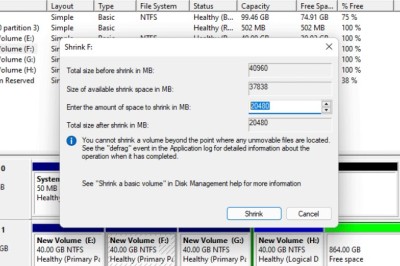views

Indoor environments have always been critical to our daily lives, but the importance of maintaining clean and safe air within these spaces has never been more apparent. Whether it's our homes, offices, schools, or hospitals, the air quality in these environments directly impacts our health and well-being. As we spend up to 90% of our time indoors, the need for effective air filtration technology becomes increasingly crucial. This article explores how advanced air filtration technology is not just a luxury but a necessity in ensuring cleaner, safer indoor environments.
Understanding the Basics of Air Filtration Technology
Air filtration technology works by trapping airborne particles and contaminants, preventing them from circulating within indoor spaces. These systems use various filters to capture pollutants like dust, pollen, smoke, and microorganisms, significantly improving indoor air quality. The effectiveness of an air filter depends on its design and the type of particles it targets.
Types of Air Filters
Several types of air filters are commonly used in air filtration systems:
- Mechanical Filters: These filters physically trap particles as air passes through them. High-efficiency particulate Air (HEPA) filters are a prime example, capable of capturing particles as small as 0.3 microns with a 99.97% efficiency rate.
- Activated Carbon Filters: These filters are designed to remove gases and odours by trapping them in a bed of activated carbon. They're particularly effective in eliminating volatile organic compounds (VOCs) and other harmful gases.
- Electrostatic Filters: These filters use an electric charge to attract and trap particles. While they are effective at capturing smaller particles, they require regular maintenance to ensure efficiency.
- Ultraviolet (UV) Germicidal Irradiation Filters: These filters use UV light to kill or inactivate microorganisms, including bacteria, viruses, and fungi. They are often used in conjunction with other filtration systems for comprehensive air disinfection and filtration.
- Hybrid Filters: These combine multiple filtration technologies, such as HEPA and activated carbon, to provide more comprehensive air purification. Hybrid filters are often found in high-end air filtration systems designed for areas with specific needs, such as hospitals and laboratories.
The Role of Air Filtration in Indoor Air Quality
Indoor air quality (IAQ) refers to the condition of the air within and around buildings, particularly as it relates to the health and comfort of building occupants. Poor IAQ can lead to various health issues, from minor irritations like headaches and dizziness to severe conditions such as asthma and respiratory infections.
Air filtration systems play a pivotal role in improving IAQ by removing harmful particles and contaminants. By filtering out pollutants like dust, smoke, and microbial spores, these systems help reduce the risk of health problems associated with poor air quality. Moreover, effective air filtration can also improve comfort levels by reducing odours and maintaining a consistent indoor climate.
The Importance of Air Filtration in Different Environments
Residential Spaces
In homes, air filtration technology is vital for creating a healthy living environment. Common indoor pollutants include pet dander, dust mites, and mould spores, all of which can trigger allergic reactions and respiratory issues. By incorporating a reliable air filter into your home's HVAC system, you can significantly reduce these contaminants and improve the overall indoor air quality.
Commercial Buildings
Offices and commercial buildings are high-traffic areas where air quality can quickly deteriorate. Airborne pollutants like dust, VOCs from office equipment, and biological contaminants from ventilation systems can lead to sick building syndrome (SBS). Air filtration technology in these environments helps maintain a healthier workspace, reducing absenteeism and increasing productivity.
Educational Institutions
Schools and universities are breeding grounds for germs and allergens. With students and staff constantly moving in and out, the potential for airborne diseases to spread is high. Implementing air filtration systems in classrooms, libraries, and common areas can help control the spread of infectious diseases, ensuring a safer learning environment.
Healthcare Facilities
In hospitals and clinics, air quality is of utmost importance. Patients with compromised immune systems are especially vulnerable to airborne infections. Air filtration technology in these settings must meet stringent standards, often involving multiple layers of filtration, including HEPA filters and UV germicidal irradiation. These systems are essential for preventing the spread of airborne diseases and ensuring the safety of both patients and healthcare workers.
Industrial Environments
Factories and industrial plants are often filled with pollutants that can be hazardous to workers' health. Dust, chemical vapours, and industrial fumes are common in these settings, making robust air filtration systems a necessity. By removing these contaminants, air filtration technology helps protect workers from respiratory diseases and other health risks associated with poor air quality.
Air Purification Systems: A Step Beyond Filtration
While air filters are effective at trapping particles, air purification systems take it a step further by actively removing or neutralising contaminants from the air. These systems often combine multiple technologies, such as filtration, ionisation, and UV light, to provide comprehensive air cleaning.
The Mechanics of Air Purification
Air purification systems work by drawing in contaminated air, passing it through one or more filtration stages, and then releasing clean air back into the environment. In addition to trapping particles, some systems use ionisation to charge particles, making them easier to capture. Others use UV light to destroy microorganisms, ensuring that the air is not only clean but also free from harmful pathogens.
Applications of Air Purification Systems
Air purification systems are particularly beneficial in environments where air quality is a critical concern. For example, in hospitals, these systems can help prevent the spread of airborne infections. In homes, they can alleviate symptoms of allergies and asthma by removing allergens from the air. In commercial settings, they contribute to a healthier workplace by reducing pollutants and improving overall air quality.
Advances in Air Filtration Technology
As the demand for cleaner indoor environments grows, so does the innovation in air filtration technology. Recent advancements have made air filtration systems more efficient, compact, and cost-effective, making them accessible to a broader range of users.
Smart Air Filtration Systems
One of the most significant advancements in air filtration technology is the development of smart systems. These systems can monitor indoor air quality in real-time and adjust their operation based on the level of pollutants detected. Some even integrate with smart home systems, allowing users to control their air filtration remotely via smartphone apps.
Energy Efficiency
Modern air filtration systems are designed with energy efficiency in mind. Innovations such as variable speed fans, energy-efficient motors, and advanced filtration materials reduce energy consumption without compromising performance. This is particularly important in commercial and industrial settings, where large-scale air filtration is required.
Portable Air Filtration Units
With the rise of remote work and the increasing focus on home offices, portable air filtration units have become popular. These units are designed to be easily moved from room to room, providing targeted air cleaning where it’s needed most. They are an excellent option for individuals who want to improve air quality in specific areas of their home or workspace.
The Future of Air Filtration Technology
The future of air filtration technology looks promising, with continued advancements aimed at improving efficiency, reducing costs, and expanding accessibility. As awareness of indoor air quality grows, we can expect to see more innovative solutions that address the unique challenges of different environments.
Integration with HVAC Systems
Future air filtration systems will likely become even more integrated with HVAC systems, offering seamless air quality management across entire buildings. This integration will make it easier to maintain consistent air quality, regardless of the building’s size or layout.
Enhanced Filtration Materials
Research is ongoing into developing new filtration materials that can capture even smaller particles and more diverse contaminants. These materials will improve the overall effectiveness of air filtration systems, ensuring cleaner and safer indoor environments.
Expanded Applications
As air filtration technology continues to evolve, we may see its application expand beyond traditional environments. For example, advanced air filtration could play a role in improving air quality in public transportation, retail spaces, and other high-traffic areas.
Conclusion
Air filtration technology is essential for maintaining cleaner, safer indoor environments. From homes and offices to hospitals and industrial plants, these systems play a critical role in protecting our health by improving indoor air quality. As technology advances, air filtration systems will become more efficient, accessible, and integrated into our daily lives. Whether you’re looking to enhance the air quality in your home or ensure a safe environment in a commercial setting, investing in a reliable air filtration system is a step towards a healthier future.
By understanding the importance of air filtration and staying informed about the latest advancements, you can make better choices to protect the health and well-being of everyone who spends time in your indoor spaces.






















Comments
0 comment